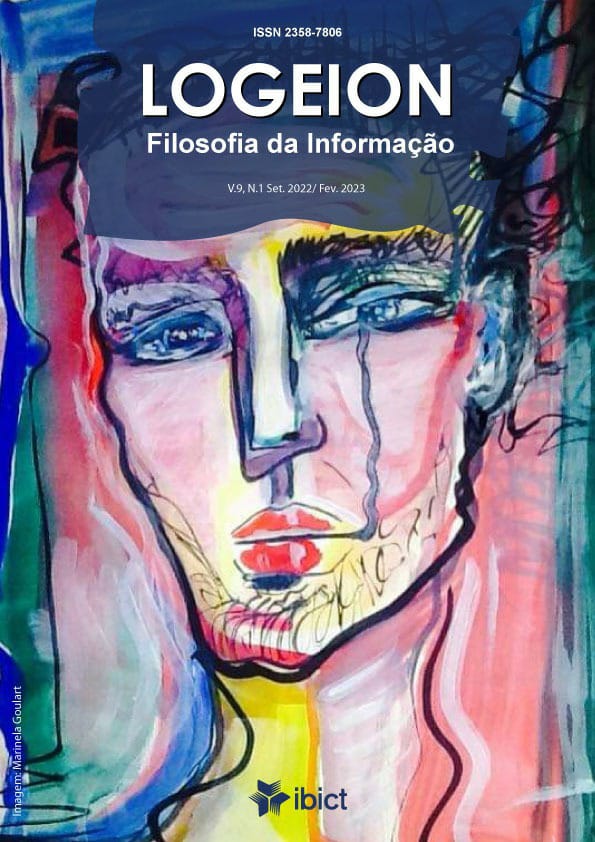Curiosity, intellectual ambition and knowledge
"que sais-je?"
DOI:
https://doi.org/10.21728/logeion.2022v9n1.p47-61Keywords:
Curiosity, Intellect, Knowledge, PhilosophyAbstract
Curiosity receives different considerations over time: bad habit, lust, vice, and virtue. The analyzes of different times and authors permeate religion, prejudices and, finally, science, which enshrines it. Is the most active faculty in childhood and adolescence and enables the development of the general aptitudes of the mind. In the remote past it was condemned by religion and considered responsible for the fall of the Adamic civilization as well as the misfortune of the mythical Pandora. Currently, researches point out that curiosity increases with uncertainty and awakens the search for knowledge. Understanding the neural basis of curiosity has important substantive implications allowed us to observe that search for information is evolutionarily adaptive. Modern technologies and internet expand the amount of information available, therefore increasing the potential effects of curiosity. The archetype intellectual ambition and the concept of knowledge are used to understand the enhancement of the intellect along with curiosity.
Downloads
References
ABBAGNANO, Nicola. Dicionário de filosofia. São Paulo: Martins Fontes, 2003.
ARAÚJO, Carlos Alberto Ávila. A ciência como forma de conhecimento. Ciências e Cognição, v. 8, p. 127-142, 2006. Disponível em: http://www.cienciasecognicao.org/revista/index.php/cec/article/view/572. Acesso em: 02 mar. 2022.
BALL, Philip. Curiosity: how Science became interesting in everything. London: The University Chicago Press, 2012. Disponível em: https://philipball.co.uk/images/stories/docs/pdf/Curiosity_synopsis_website.pdf. Acesso em: 16 fev. 2022.
CHAUÍ, Marilena. Convite à filosofia. 12.ed. São Paulo: Ática, 2001.
COSCARELLI, Carla Viana. Reflexões sobre as inferências. In: CONGRESSO BRASILEIRO DE LINGUISTICA APLICADA. 6., Minas Gerais. [Anais]. Minas Gerais: Faculdade de Letras da UFMG, 2002. CD Rom.
COSTA, P. Fontes da. The culture of curiosity at the Royal Society in the first half of the eighteenth century. Notes Rec. R. Soc. Lond., v. 56, n. 2, p. 147–166, 2002. Disponível em: https://royalsocietypublishing.org/doi/abs/10.1098/rsnr.2002.0175. Acesso em: 18 fev. 2022.
DESCARTES, René. Discurso do método. São Paulo: Martins Fontes, 2003.
HARRISON, Peter. Curiosity, forbidden knowledge, and the reformation of natural philosophy in early modern England. Isis, v. 92, n. (jun. 2001), p. 265-290, jun. 2001. Disponível em: https://www.journals.uchicago.edu/doi/abs/10.1086/385182. Acesso em: 18 fev. 2022.
KANG, Min Jeong et al. The wick in the candle of learning epistemic curiosity activates reward circuitry and enhances memory. Psychological Science, v. 20, n. 8, p. 963-973, 2009. Disponível em: https://journals.sagepub.com/doi/full/10.1111/j.1467-9280.2009.02402.x. Acesso em: 04 mar. 2022.
KELLER, Albert. Teoria geral do conhecimento. São Paulo: Edições Loyola, 2009.
KIM, Jeong-Yoo; HAEREE, Lee; INSIK, Min. The economics of curiosity. Korean Economic Review, n. 29, p. 23-50, 2013. Disponível em: http://keapaper.kea.ne.kr/RePEc/kea/keappr/KER-20130630-29-1-02.pdf. Acesso em: 08 fev. 2022.
LOEWESTEIN, George. The psychology of curiosity: a review and reinterpretation. Psychological Bulletin, v. 116, n. 1, p. 75-98, 1994. Disponível em: https://psycnet.apa.org/fulltext/1994-41058-001.html. Acesso em: 31 jan. 2022.
LÓPEZ, Alberto. Machado de Assis, um gênio autodidata da literatura brasileira. El País, 21 jun. 2017. Disponível em: https://brasil.elpais.com/brasil/2017/06/21/cultura/1498045717_148849.html. Acesso em: 16 mar. 2022.
LOPEZ, Felix. Repertórios sobre as razões da desigualdade no Brasil. In: INSTITUTO DE PESQUISA ECONÔMICA APLICADA. Classes sociais, Estado e desigualdades. Boletim de Análise político institucional, n. 23, jun. 2020. p. 57-68. Disponível em: http://repositorio.ipea.gov.br/bitstream/11058/10172/1/200806_bapi%2023_artigo_5.pdf. Acesso em: 15 maio 2022.
LYONS, Jonathan. A casa da sabedoria: como a valorização do conhecimento pelos árabes transformou a civilização ocidental. Rio de Janeiro: Zahar, 2011.
MANGUEL, Alberto. Uma história natural da curiosidade. São Paulo: Companhia das Letras, 2015.
MARCUSE, Herbert. A responsabilidade da ciência. Scientiae Studia, v. 7, n. 1, p. 159-164, 2009. Disponível em: https://www.scielo.br/j/ss/a/D9dDCGXsSK45s6KtWrWVDwH/?lang=pt. Acesso em: 17 abr. 2022.
MARÍAS AGUILERA, Julian. Elogio de la ambición intelectual. Diario ABC, Madrid, 31 de outubro de 1996.
MORA, José Ferrater. Dicionário de filosofia. Lisboa: Dom Quixote, 1978.
MORIN, Edgar. A cabeça bem-feita: repensar a reforma, reformar o pensamento. 7.ed. Rio de Janeiro: Bertrand Brasil, 2002.
POERSCH, José Marcelino. A leitura como fonte de saber linguístico: processos cognitivos. Letras de hoje, Porto Alegre, v. 36, n. 3, p. 401-407, 2001.
QUEIROZ, Eça de. Eça de Queirós: curiosidade: instinto que leva alguns a... Disponível em: https://www.pensador.com/frase/NzMyNzIw/. Acesso em: 12 mar. 2022.
RAMOS, Gabriel L. P. M. O visível e o invisível: uma leitura especulativa de “Le peintre de la vie moderne”. Scripta Alumni, Curitiba, v. 24, n. 2, p. 150-167, 2021. Disponível em: https://revista.uniandrade.br/index.php/ScriptaAlumni/article/view/2157. Acesso em: 22 mar. 2022.
SARUKKAI, Sundar. A ciência e a ética da curiosidade. 2009.
STORCK, Alfredo. Filosofia medieval. Rio de Janeiro: Jorge Zahar, 2003.
WALSH, P. G. The rights and wrongs of curiosity (Plutarch to Augustine). Greece & Rome, n. 35, p. 73-85, 1988. doi:10.1017/S0017383500028783. Disponível em: https://www.cambridge.org/core/journals/greece-and-rome/article/abs/rights-and-wrongs-of-curiosity-plutarch-to-augustine1/028A8D58A42762983C3F278A2C3AA540#. Acesso em: 04 abr. 2022.
Downloads
Published
Issue
Section
License
Copyright (c) 2023 Logeion: Filosofia da Informação

This work is licensed under a Creative Commons Attribution-NonCommercial-ShareAlike 4.0 International License.
The journal is published under the Creative Commons - Attribution - Noncommercial - Share Alike 3.0 Brazil.
The published work is considered collaboration and therefore the author will not receive any remuneration for this as well as anything will be charged in exchange for publication.
All texts are responsibility of the authors.
It’s allowed partial or total reproduction of the texts of the magazine since the source is cited.














